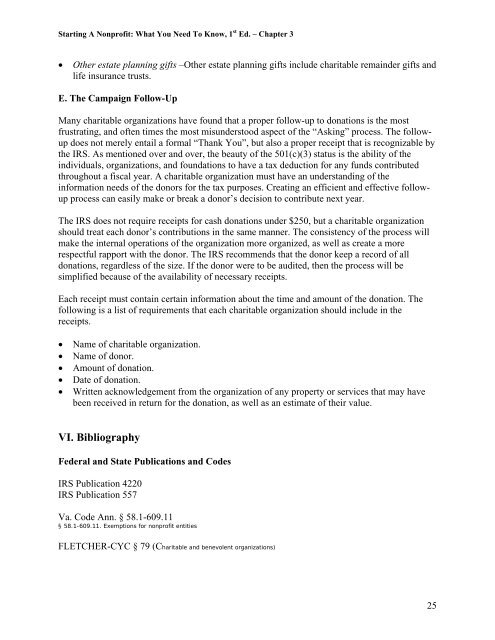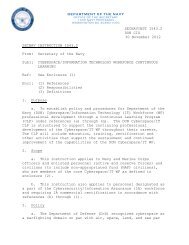HowToFormANonprofit_1st_ed-Chapter3
HowToFormANonprofit_1st_ed-Chapter3
HowToFormANonprofit_1st_ed-Chapter3
Create successful ePaper yourself
Turn your PDF publications into a flip-book with our unique Google optimized e-Paper software.
Starting A Nonprofit: What You Ne<strong>ed</strong> To Know, 1 st Ed. – Chapter 3<br />
• Other estate planning gifts –Other estate planning gifts include charitable remainder gifts and<br />
life insurance trusts.<br />
E. The Campaign Follow-Up<br />
Many charitable organizations have found that a proper follow-up to donations is the most<br />
frustrating, and often times the most misunderstood aspect of the “Asking” process. The followup<br />
does not merely entail a formal “Thank You”, but also a proper receipt that is recognizable by<br />
the IRS. As mention<strong>ed</strong> over and over, the beauty of the 501(c)(3) status is the ability of the<br />
individuals, organizations, and foundations to have a tax d<strong>ed</strong>uction for any funds contribut<strong>ed</strong><br />
throughout a fiscal year. A charitable organization must have an understanding of the<br />
information ne<strong>ed</strong>s of the donors for the tax purposes. Creating an efficient and effective followup<br />
process can easily make or break a donor’s decision to contribute next year.<br />
The IRS does not require receipts for cash donations under $250, but a charitable organization<br />
should treat each donor’s contributions in the same manner. The consistency of the process will<br />
make the internal operations of the organization more organiz<strong>ed</strong>, as well as create a more<br />
respectful rapport with the donor. The IRS recommends that the donor keep a record of all<br />
donations, regardless of the size. If the donor were to be audit<strong>ed</strong>, then the process will be<br />
simplifi<strong>ed</strong> because of the availability of necessary receipts.<br />
Each receipt must contain certain information about the time and amount of the donation. The<br />
following is a list of requirements that each charitable organization should include in the<br />
receipts.<br />
• Name of charitable organization.<br />
• Name of donor.<br />
• Amount of donation.<br />
• Date of donation.<br />
• Written acknowl<strong>ed</strong>gement from the organization of any property or services that may have<br />
been receiv<strong>ed</strong> in return for the donation, as well as an estimate of their value.<br />
VI. Bibliography<br />
F<strong>ed</strong>eral and State Publications and Codes<br />
IRS Publication 4220<br />
IRS Publication 557<br />
Va. Code Ann. § 58.1-609.11<br />
§ 58.1-609.11. Exemptions for nonprofit entities<br />
FLETCHER-CYC § 79 (Charitable and benevolent organizations)<br />
25





